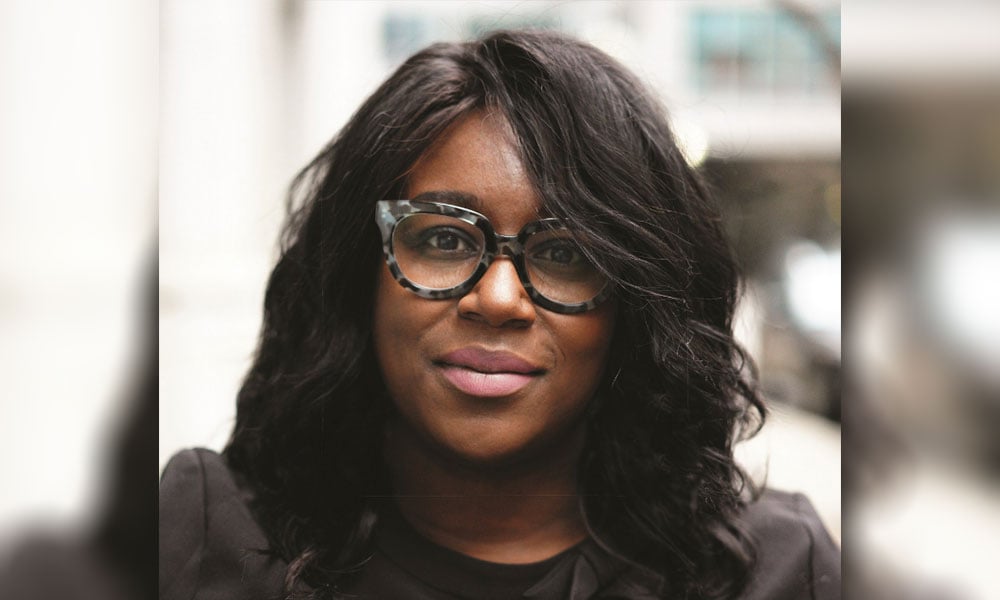
When life seems like one tough break after another, Charlene Theodore has a support system to remind her she is far from an imposter

There seems to be no shortage of successful women who admit they struggle to see themselves as deserving of what they’ve earned — from former first lady Michelle Obama to “Lean In” author Sheryl Sandberg.
But when life seems like one tough break after another, Charlene Theodore has a support system to remind her she is far from an imposter — in fact, she’s done the hard work to get where she is in her career.
“When you're faced with that fear of making a stand or making a new choice, you have to remind yourself: You've already done the hardest thing. There's already so much that you've accomplished,” she says. “You sacrifice. Your parents sacrificed. At this point in your career, if you're kind of getting that false sense of insecurity or fear, I do like to think to myself, ‘You know, I've already done the hardest thing.’”
Theodore is set to speak at Canadian Lawyer’s Women in Law Summit on Feb. 12 in Toronto about “executing diversity and inclusion strategies that attract and retain female talent.”
Through mentorship, Theodore — who in Sept. 2020 will become the first Black lawyer to lead the Ontario Bar Association — has learned to navigate a field where she is often the only Black woman in the room. While it’s not always easy, she says she’s passionate about sharing the role that diversity has played in shaping her legal career.
“Women - specifically Black women - have really taken a personal interest in my success and understand the unique challenges that I have faced or will face in my career,” she says. “People in the industry are trying — whether consciously or unconsciously, through unconscious bias — to limit what your options are. Other women can help remind you that — even if they’ve never had a Black person in management and have never had a Black female boss — this is something you can and should do.”
Before her current role in-house at the Ontario English Catholic Teachers' Association, she worked on human rights legal issues at the African Canadian Legal Clinic and International Bar Association’s commercial law fellowship in the U.K. The opportunities were sparked, in part, by her education at Schulich School of Law at Dalhousie University, which until earlier this year had the only comprehensive pipeline program to increase the participation of Black and Indigenous students in the study and practice of law - the Indigenous Blacks and Mi'kmaq Initiative.
”Putting that plan into place really drew not just Black and Indigenous law students from Nova Scotia but students from all over, because of the focus, outreach and care and awareness of the systemic barriers that keep marginalized communities out of law,” she says.
“It made me aware of not only what those barriers are in law — that prevent full participation from everybody, from all races and walks of life — but also the solutions. Not just for law schools, but for any setting where you really want to make systemic change.”
Without the traditional articling-to-law-firm resume, Theodore says she was aware she stood out. But, she says, she got positive feedback from the labour and employment bar at a time when going straight in-house was far from the norm.
“I always tell young lawyers that you're not in the position to know where your transferable skills lie,” she says. “Be real, be pragmatic and realistic, but don't be afraid to apply for a position that you're interested in, but you maybe feel like you they don't have the right experience for.”
Law isn’t the first career for Theodore, a Toronto native whose parents came from the Caribbean. As a teenager, she’d realized the power of the legal system after reading the story of Steven Truscott’s wrongful conviction — and a legal career had been in the back of her mind ever since.
Having studied psychology and mulled an MBA, she ultimately gave up her career in the quickly growing Employee Assistance Program industry to go to Halifax.
“Mentorship generally has shaped my career and my personal development in positive ways, even before I knew it was ‘mentorship,’” she says. “I was preparing to quit my job and kind of give everything up and move to Halifax. And somebody had given me the name of a Dalhousie alumnus: Someone I didn't know at all, had never met before. I called him and he was so kind and generous with time and advice. . . . I was like, okay, this is an industry where we help each other out.”
She decided she wanted to pay it forward. But despite being a people person — hearing from co-workers and teachers are the highlights of her week — Theodore says it took her too long to realize how powerful it can be to connect with the wider profession through organizations like the Ontario Bar Association, Canadian Association of Black Lawyers and Black Female Lawyers Network.
“My attitude when going in-house — and having so much to learn for the first time about litigation in the labor context — was just put my nose to the grindstone and just work, work, work. Going in-house is a great career option, but I think it can be kind of isolating. You're not necessarily connected to the wider bar,” she says.
“And I did feel that way for quite a few years in my career. And then, somebody said, ‘Come out to an OBA meeting.’ And it really did make a difference — in terms of not just my career satisfaction, but also personal satisfaction with my career path.”